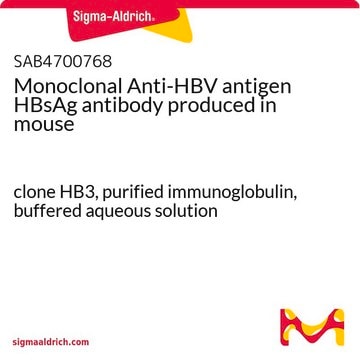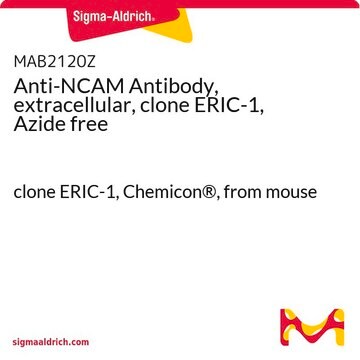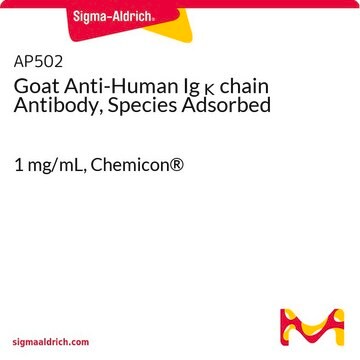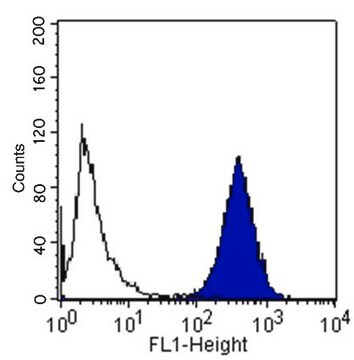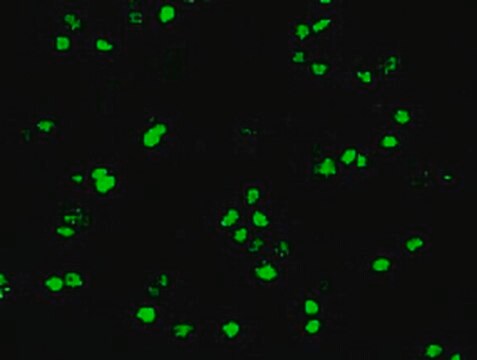MABE1177
Anti-PNKP Antibody, clone H101.2
clone H101.2, from mouse
Sinônimo(s):
Bifunctional polynucleotide phosphatase/kinase, DNA 5′-kinase/3′-phosphatase, Polynucleotide kinase-3′-phosphatase
About This Item
Produtos recomendados
fonte biológica
mouse
forma do anticorpo
purified immunoglobulin
tipo de produto de anticorpo
primary antibodies
clone
H101.2, monoclonal
reatividade de espécies
human, bovine, monkey
técnica(s)
ELISA: suitable
immunoprecipitation (IP): suitable
western blot: suitable
Isotipo
IgG1κ
nº de adesão NCBI
nº de adesão UniProt
Condições de expedição
wet ice
modificação pós-traducional do alvo
unmodified
Informações sobre genes
human ... PNKP(11284)
Descrição geral
Especificidade
Imunogênio
Aplicação
Epigenetics & Nuclear Function
Cell Cycle, DNA Replication & Repair
Western Blotting Analysis: A representative lot detected the endogenous PNKP in A549 whole cell lysates, as well as purified full-length 60 kDa recombinant human PNKP and its 14.9 kDa N-terminal (a.a. 2-140) cyanogen bromide cleavage fragment (Fanta, M., et al. (2001). Hybridoma. 20(4):237-242).
Western Blotting Analysis: A representative lot detected the endogenous PNKP in CHO cell lysates and calf thymus tissue homogenates (Fanta, M., et al. (2001). Hybridoma. 20(4):237-242).
Immunoprecipitation Analysis: A representative lot immunoprecipited PNKP from A549 cell lysates (Fanta, M., et al. (2001). Hybridoma. 20(4):237-242).
ELISA Analysis: Clone H101.2 hybridoma culture supernatant was confirmed for its immunoreactivity against His-tagged human PNKP by ELISA (Fanta, M., et al. (2001). Hybridoma. 20(4):237-242).
Qualidade
Western Blotting Analysis: 8.0 µg/mL of this antibody detected PNKP in 50 µg of A549 cell lysate.
Descrição-alvo
forma física
Armazenamento e estabilidade
Outras notas
Exoneração de responsabilidade
Não está encontrando o produto certo?
Experimente o nosso Ferramenta de seleção de produtos.
Código de classe de armazenamento
12 - Non Combustible Liquids
Classe de risco de água (WGK)
WGK 1
Ponto de fulgor (°F)
Not applicable
Ponto de fulgor (°C)
Not applicable
Certificados de análise (COA)
Busque Certificados de análise (COA) digitando o Número do Lote do produto. Os números de lote e remessa podem ser encontrados no rótulo de um produto após a palavra “Lot” ou “Batch”.
Já possui este produto?
Encontre a documentação dos produtos que você adquiriu recentemente na biblioteca de documentos.
Nossa equipe de cientistas tem experiência em todas as áreas de pesquisa, incluindo Life Sciences, ciência de materiais, síntese química, cromatografia, química analítica e muitas outras.
Entre em contato com a assistência técnica

